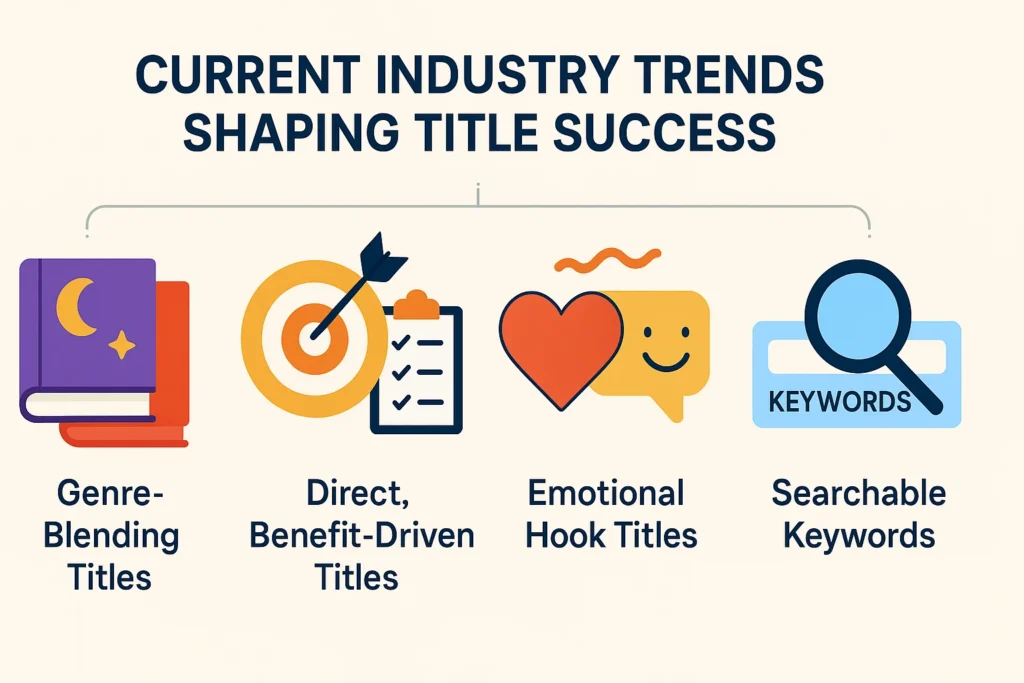Want to sell more books in today’s cutthroat market?
Every author knows a killer book title is the first step to success. It’s your first (and sometimes only) chance to hook a reader. With over 44 million book titles globally, creating a title that resonates is tougher than ever.
Problem:
Titles that connect with readers and drive sales are hard to create. Print book sales in 2025 only rose 1% while competition has never been more fierce.
If you want to get lost in a big sea of noise, use a boring title
Don’t do this to your books. This article is going to show you how to optimizing book titles for current market trends. We’ll also cover the best data-driven title strategies that actually work in 2024.
Let’s get into it!
You’ll learn:
- Why Book Titles Matter More Than Ever
- Current Industry Trends Shaping Title Success
- Data-Driven Title Optimization Strategies
- How AI Tools Can Supercharge Your Title Creation
Why Book Titles Matter More Than Ever
Book titles have always been important, but here’s the thing…
In 2025 your title is fighting for readers’ attention against EVERYTHING else in their lives. Social media, streaming services, podcasts, hobbies, other books, and just being busy.
New Reality of Book Discovery
Think about how readers discover books today.
Rarely are they browsing in physical bookstores. They’re scrolling on Amazon, seeing BookTok videos, or getting title recommendations in their social feeds. Savvy authors now use tools like Squibler’s book title generator to create attention-grabbing titles for these fleeting moments. You have maybe 2-3 seconds to grab their attention.
That’s it.
Your title needs to tell them in that split second what the book is about, who it’s for, and why they should care.
And it must be all of the above while being memorable, searchable, and on-trend.
The Social Media Factor
Did you know…
76% of users make purchases after seeing something on social media. Titles shown on BookTok receive 40% sales boosts just for being featured.
But the tricky part is that your title needs to work in tiny social media thumbnails, short video descriptions, and even search queries.
If it’s too long or complex, it gets cut off or ignored. Titles that win in social media are short, punchy, and fit in that tiny space.
Current Industry Trends Shaping Title Success

Publishing has changed. Here is exactly what’s working right now.
Trend #1: Genre-Blending Titles
Romance and fantasy are where it’s at in 2025. “Romantasy” is on fire, with fantasy books rocketing 35.8% in sales overall.
Translation for your title: If your book combines multiple genres, embrace it. Genre-blending titles that clearly signal the mix (fantasy/romance/scifi/etc) outperform those trying to fit in one box.
Trend #2: Direct, Benefit-Driven Titles
Non-fiction leads 37% of Amazon print sales in 2025, and the titles are leading the way.
They tell readers exactly what the book will give them. Look at “Atomic Habits” – the title tells you it’s about small changes that create better habits.
This formula is how nonfiction titles like that sold 982,000 copies in 2025 alone.
Trend #3: Emotional Hook Titles
Emotional hooks that make the reader feel something just by reading the title are dominating fiction. From It Ends with Us to The Seven Husbands of Evelyn Hugo, titles that pull on the heartstrings immediately are at the top of bestseller lists.
Trend #4: Searchable Keywords
Forget organic discovery. With 83% of ebook market on Amazon, your title needs to play nice with their algorithm. Searchable, direct titles with obvious keywords perform best in both organic and paid ads.
Data-Driven Title Optimization Strategies
Want to optimize your title with actual data? Here’s exactly how to do it.
Strategy #1: Analyze Bestselling Titles in Your Category
Look at the top 20 bestsellers in your book’s specific genre on Amazon. Observe patterns.
- Length (most successful: 1-4 words)
- Keywords they use
- Emotional triggers
Reverse-engineer what’s working for those books and adapt it for your own.
Strategy #2: Test Multiple Variations
Never settle on your first title idea. Create 10-15 options and test them against each other. Get feedback from beta readers, use social media polls, and even A/B test in pre-launch marketing.
Strategy #3: Use AI for Title Generation
AI book title generators are a game changer. Feed them your book info and they’ll generate dozens of options based on data of current bestsellers and market trends.
AI algorithms analyze successful title patterns faster than any human and can spit out variations you would never think of.
Combine their AI insights with your own creativity and testing to create winning titles.
Strategy #4: Consider Series Potential
Planning a series? Titles need to work for future books too. Look at successful series titles – they usually have a consistent format making each book instantly recognizable as part of the collection.
How AI Tools Can Supercharge Your Title Creation
30% of publishers say they now see significant marketing effectiveness boosts from AI tools. Let’s talk how you can leverage this to supercharge your title game.
The AI Advantage
AI tools can crunch massive amounts of data, identifying patterns and keywords human brains would miss. They can parse through successful titles in every genre and suggest trending keywords with high search volume.
AI algorithms will generate title variations faster than any human, saving time while uncovering new possibilities.
Smart Implementation
Don’t just copy the AI suggestions. Use them as inspiration to be built upon. The best titles are created when AI insights are combined with a human creator’s unique understanding of their book.
Testing and Refinement
AI tools are not magical title creators. Once you have AI-generated options, ruthlessly test them. Sounds great to you might not click with your target audience. Data beats opinions every time.
Making Your Title Work Across All Formats
Your title needs to be awesome whether a reader sees it on a tiny phone screen, book spine, social media post, or audiobook thumbnail.
Practically this means:
- It must be readable at small sizes.
- Not too complex or fancy words.
- Easy to say for audiobook readers.
Wrapping It All Up
Optimizing book titles for current trends is less about being “creative” and more about being strategic.
In a market where book publishing sales rose 6.5% in 2025, getting your title right can be the difference between getting lost in the noise or getting discovered.
Winning is formulaic:
- Understanding the current market and top trends
- Using data to inform decisions and optimization
- Leveraging AI tools for creative generation and testing
- Crafting titles that work across all platforms and formats
Remember, your title is often a book’s first (and sometimes only) chance to hook a reader. Don’t squander it.
Ready to optimize your title? Try coming up with 5-10 options for your next book. Combine both traditional brainstorming AND AI tools, then get feedback on each before deciding.
Authors who take advantage of these strategies will win in today’s competitive market. Don’t leave your book’s discoverability to chance. Optimize your title and watch it soar.

